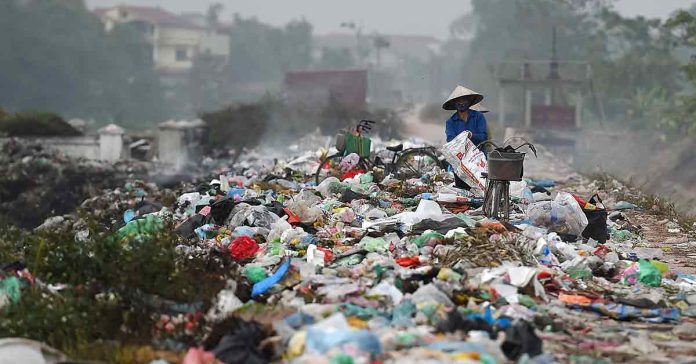The UN estimates that plastic makes up 80 per cent of the waste in the ocean. Rubbish and improperly disposed plastic items enter the ocean through rivers and seas, World Economic Forum website reminds.
Countries are struggling with the problem to varying degrees. A report by Lourens J.J. Meijer in the Journal of the American Association for the Advancement of Science reveals that the biggest contributors to plastic pollution are not the countries that produce or consume the most. The worst polluters are nations with inadequate waste management systems that allow plastic to enter the sea through their polluted rivers.
Six of the ten countries with the highest levels of pollution are located in South-East Asia. The Philippines is ahead of the other polluting countries by a wide margin, with 356,371 metric tonnes of plastic waste entering the ocean in one year, which is about 35% of the global figure.
Malaysia (73,098 metric tonnes), Indonesia (56,333), Myanmar (40,000), Vietnam (28,221) and Thailand (22,806) follow close behind. South-East Asia accounts for more than half of the world’s ocean plastic pollution, so tackling plastic waste in the region will help to clean up the entire planet.
Pollution not only affects biodiversity, human and animal health, but also seriously harms tourism and fisheries, which form an essential part of the region’s economy.
Countries adopted the 2019 Bangkok Declaration on Combating Marine Debris in the ASEAN Region, under which they recognised their duty to cooperate to protect their coasts, seas and livelihoods from marine plastic pollution. In 2021, they launched the Regional Action Plan for Combating Marine Debris.
The five-year plan has three main areas of focus: reducing plastic use and production; improving collection and recycling; and promoting reuse. In September 2023, the 43rd ASEAN Summit released the Blue Economy Framework, which reaffirmed the members’ commitment.
The ban on single-use plastics is an example of a national policy that aims to “turn off the plastic tap,” since most of the plastic pollution is caused by plastic straws, bags, sachets and food packaging.
Nations are also gradually introducing schemes of Extended Producer Responsibility (EPR). The move will force manufacturers to take responsibility for the entire life cycle of a product, including disposal and recycling. Producers are being urged to comply with waste reduction targets, as well as pay levies that will go towards funding a plastic waste collection and recycling system.
This policy is the key to facilitating a shift from a linear production model (produce, use, dispose) to a cyclical one based on reuse and recycling. Countries implementing the policy have already achieved results: Japan, for example, reduced its packaging by 16 per cent between 1996 and 2009.
The European Union is calling on all its Member States to develop policies related to plastic producer responsibility by 2024. In the ASEAN region, such adoption is still at an early stage.
In 2022, Vietnam became the first South-East Asian country to oblige producers and importers to commit to packaging, recycling and waste management. The Philippines followed suit by passing the EPR Act in July 2022. In Thailand, such initiatives are only voluntary.
Regional co-operation is becoming crucial for developing more effective policies. Dialogue between countries facilitates the sharing of lessons learned from pilot projects and the scale-up of successful solutions developed at the local level.
Initiatives to tackle plastic pollution include clean-ups, awareness campaigns, and artificial intelligence technology for plastic collection, providing better opportunities for waste pickers.
Decisive, integrated action can transform ASEAN from the region most affected by ocean plastic pollution to the one with the boldest green ambitions, taking concrete steps to solve the crisis.
Indonesia and Vietnam, for example, were the first two countries to join the Global Plastic Action Partnership (GPAP) in 2019 and 2020, establishing National Plastic Action Partnerships.
ASEAN countries’ participation in initiatives such as the World Economic Forum’s GPAP can enable them to create effective models of co-operation and advocate for the paradigm shift needed to address the plastic crisis.
